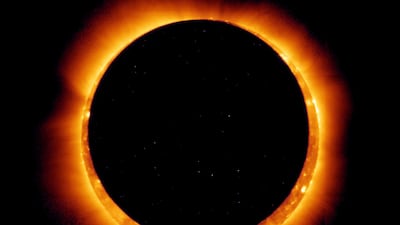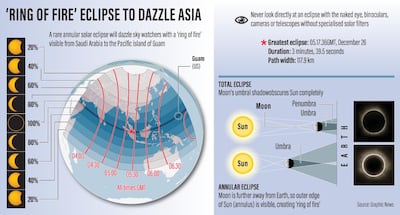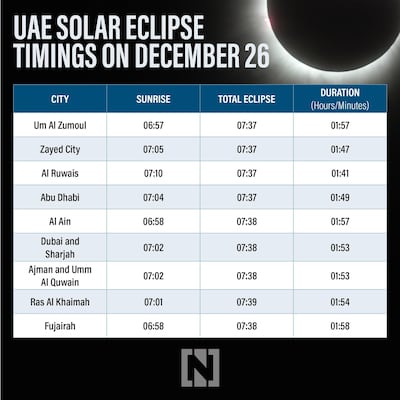UAE residents are set to enjoy a stunning 'ring of fire' solar eclipse this month. It is an extremely rare event in the UAE and it comes 172 years after the last one was seen in the Emirates. Here is what you need to know:
What kind of eclipse?
Known as an annular solar eclipse, the moon will pass in front of the sun’s centre, leaving its edges to form a bright circle – sometimes known as a 'ring of fire'. This occurs when the moon is farthest from Earth.
“The disc of the moon will move in front of the sun but because of the moon’s distance from Earth, it will only partially cover it, causing a ring-type visual,” said Hasan Al Harari from Dubai Astronomy Group.
“Because of its rarity, this is quite a spectacular event. It does not happen as often as a total eclipse.”
When and where can you see the eclipse?
Stargazers in the UAE can view the spectacle on December 26. Liwa in Abu Dhabi's Western Region is considered to be the best area of the UAE to see the ring of fire effect as there is very little light pollution there.
The full eclipse, which will start at 7.25am, will last just a few minutes. However, the total solar spectacle will last more than two hours. The event will also be visible in Saudi Arabia, Oman, India, Sri Lanka, Malaysia, Indonesia and Singapore, among others. The next one in the UAE won't be for another 80 years at least, so set your alarms.
Are there any public events in the UAE?
There are several being held across the UAE. Dubai Astronomy Group is holding events to mark the eclipse at Mushrif Park in Dubai. The UAE Space Agency will also be monitoring the rare event.
"Happening in the UAE for the first time since 1847, the annular solar eclipse will be closely monitored by various space and astronomy-related entities across the UAE," said Mohammed Al Ahbabi, director general of the UAE Space Agency.
"Sponsoring these events comes in line with the UAE Space Agency’s efforts to achieve its strategic goals of raising awareness about the national space sector, along with other space and astronomical activities that the UAE is hosting."
Be careful looking at the sun
The space agency warned residents about the risks of looking directly at the sun without proper eye protection, or viewing the eclipse through regular sunglasses, an unfiltered camera lens, a telescope or binoculars.
"Looking directly at solar eclipses can cause severe damage to the eyes," the agency stressed.
Solar filters or solar eclipse glasses that are no older than three years, scratch-free, and have the name and address of the manufacturer should be used. Dubai Astronomy Group and the UAE Space Agency will be distributing solar eclipse glasses to all schools.




